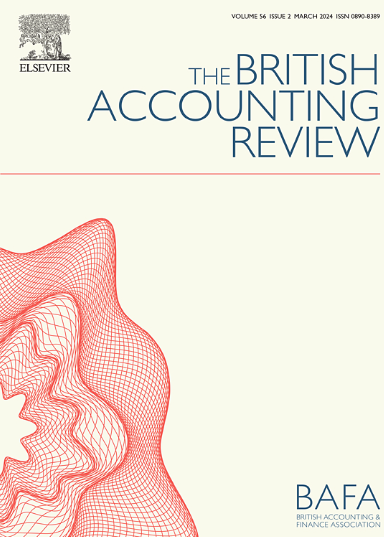On professional destabilization and accounting self-regulation
IF 9.4
3区 管理学
Q1 BUSINESS, FINANCE
引用次数: 0
Abstract
The accounting profession faces significant upheaval due to numerous destabilizations in its environment, with financialization being particularly impactful. This paper introduces a theoretical framework to dissect how the profession reacts to such disruptions. We posit that destabilizations give rise to novel types of misconduct, leading professional bodies to re-evaluate their definitions of (un)acceptable accounting behaviours. However, the intrinsically nebulous essence of accounting's foundational logic muddies these recalibrations. This vagueness, when paired with evolving misconduct, undermines specific regulatory measures, possibly instigating further destabilization. Our proposed accounting destabilization and regulation framework is exemplified through a case study focusing on the emerging regulation of valuation advisory work – a service line that is emblematic of financialization – in a Canadian provincial jurisdiction. This case underscores the challenges the profession faces due to financialization, highlighting the current regulatory strategy that treats valuation work as a strictly technical process; an approach that we show is inadequate in mitigating valuation-related misconduct. The paper enriches the literature by introducing a novel theoretical framework for evaluating emerging challenges in accounting regulation, and by delineating the case study's repercussions for the evolving financialized landscape of the accounting profession.
关于职业不稳定和会计自律
会计行业因其所处环境的诸多不稳定因素而面临重大动荡,其中金融化的影响尤为突出。本文介绍了一个理论框架,以剖析会计行业如何应对此类动荡。我们认为,不稳定因素会引发新型不当行为,导致专业机构重新评估其对(不可)接受的会计行为的定义。然而,会计基础逻辑本质上的模糊性使这些重新调整变得模糊不清。这种模糊性与不断演变的不当行为相结合,破坏了具体的监管措施,可能会引发进一步的不稳定。我们提出的框架通过一个案例研究得以体现,该案例研究的重点是加拿大一个省级司法管辖区对估值咨询工作的新兴监管--该服务项目是金融化的象征。该案例强调了金融化给该行业带来的挑战,突出了当前将估值工作视为严格的技术流程的监管策略;我们表明,这种方法不足以减轻与估值相关的不当行为。本文引入了一个新颖的理论框架来评估会计监管中新出现的挑战,并阐述了案例研究对会计行业不断演变的金融化前景的影响,从而丰富了相关文献。
本文章由计算机程序翻译,如有差异,请以英文原文为准。
求助全文
约1分钟内获得全文
求助全文
来源期刊

British Accounting Review
BUSINESS, FINANCE-
CiteScore
8.60
自引率
3.90%
发文量
39
审稿时长
76 days
期刊介绍:
The British Accounting Review*is pleased to publish original scholarly papers across the whole spectrum of accounting and finance. The journal is eclectic and pluralistic and contributions are welcomed across a wide range of research methodologies (e.g. analytical, archival, experimental, survey and qualitative case methods) and topics (e.g. financial accounting, management accounting, finance and financial management, auditing, public sector accounting, social and environmental accounting; accounting education and accounting history), evidence from UK and non-UK sources are equally acceptable.
 求助内容:
求助内容: 应助结果提醒方式:
应助结果提醒方式:


